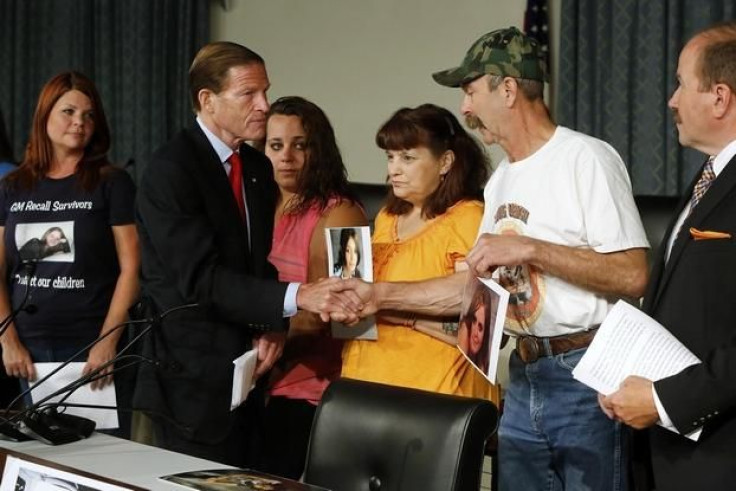GM Recall Senate Hearings: Senators Propose Criminalizing What GM Has Admitted Doing, Here’s The Full Text Of The ‘Hide No Harm’ Act

A day before GM CEO Mary Barra heads to Washington to testify for a third time in front of lawmakers regarding her company’s handling of the fatal ignition switch flaw in millions of older GM cars, senators announced Wednesday a new bill that would criminalize some of GM’s admitted behavior.
If the Democrat-sponsored bill passed, individual company officers could risk prison time if products they oversee lead to consumer or employee death and injury.
“As early as 2004, corporate officers at General Motors were aware of an ignition defect in certain vehicles that should have been recognized as a serious danger,” Sens. Richard Blumenthal (D-Conn.), Tom Harkin (D-Iowa) and Robert Casey (D-Pa.) said in a statement announcing the measure. “GM’s own internal investigation concluded that, as early as 2011, high-level corporate officers at GM recognized the serious dangers.”
In June, Barra said 15 employees were identified for not tackling the problem of the flawed ignition switch the company has linked to 16 deaths and 61 crashes. Five other were disciplined, she added.
Under the proposed legislation, any “employer, director of officer” with the authority to “acquire knowledge of any serious danger” associated with a company’s product, component or service would risk up to five years in prison and potential fines.
The identities of most of the employees General Motors Co. (NYSE:GM) has disciplined have been kept secret over privacy concerns, but Barra said in congressional testimony last month that some were executive-level officers. The bill proposed Wednesday would strip anonymity of these employees by charging them with criminal negligence.
GM CEO Mary Barra, top GM lawyer Michael Millikin, and Rodney O’Neal, CEO of Delphi Automotive, which manufactured the faulty ignition switch, are set to testify before a Senate Commerce, Science and Transportation on Thursday.
The New York Times reported on Tuesday that documents obtained from the National Highway Traffic Safety Administration (NHTSA) suggest the company stonewalled efforts to investigate the ignition switch flaw. The company paid the maximum penalty of $35 million for taking too long to prepare responses to the NHTSA’s inquiries. Senator Blumenthal has proposed legislation to lift that cap because he said $35 million isn’t sufficient to discourage delaying tactics from a company the size of GM.
On Wednesday, GM reported its first-half 2014 sales (pdf), showing a 5.2 percent decline in Chevrolet, the brand most associated with the ignition switch recall. Overall GM reported 5.6 percent growth in North American deliveries, to 929,759 cars, SUVs trucks, and a 8.1 percent jump in China sales, to 2.5 million.
GM is set to announce its second quarter earnings on July 24. Analysts polled by Reuters believe the world’s third-largest automaker is expected to report $1.6 billion in profit on $40.6 billion in revenue when it reports the results of its second quarter ending June 30. GM will take a $1.2-billion hit in the quarter for the cost of recall-relate repairs, bringing the total so far to $2.5 billion in 2014. The next earnings report is expected to provide additional information about the cost of its recall activates.
Late last month, GM announced it was recalling 8.23 million cars for the ignition switch flaw, putting the total affected vehicles at nearly 11 million sedans and crossover SUVs from model years 1997 to 2014. So far this year, GM has called back an industrywide record 29 million autos.
Read the full text of the "Hide No Harm" Act here:
© Copyright IBTimes 2024. All rights reserved.












